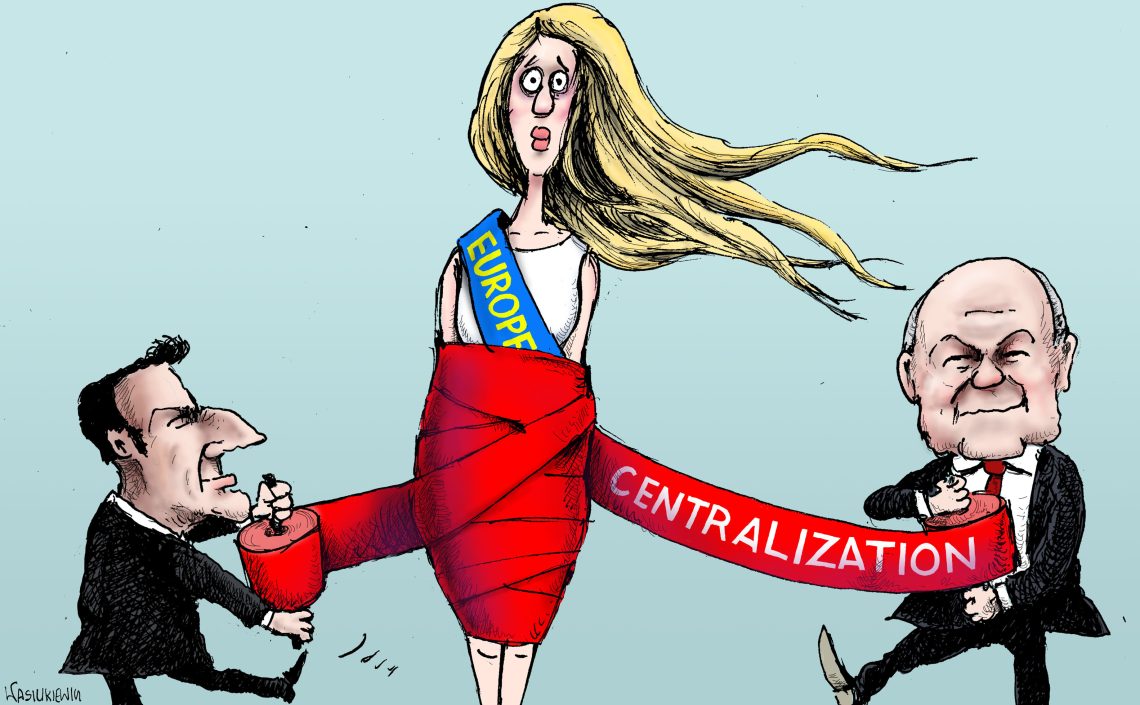The perils of technocratic European integration
European defense and additional integration are fine goals, but they should not come at the cost of greater centralization.

In 2017 at the Sorbonne, French President Emmanuel Macron gave a much commented-on speech in which he laid out his vision of Europe. In a nutshell, he presented the European Union as a consolidated, national state. It was a blueprint for a large French Republic, with a dominating administration and centralized finances, especially debt. To achieve this goal, he arrogantly proposed a two-track EU that consisted of a core and periphery.
In a similar manner, German Chancellor Olaf Scholz held forth at the end of August at the famous Charles University in Prague, the oldest institution of higher learning in the former Holy Roman Empire.
The EU is the result of a marvelous European integration process. It was primarily designed as a “fatherland of the fatherlands,” as former French President Charles de Gaulle called it: a decentralized unit to allow nation-states to integrate in various areas, especially the internal market, which has been so successful. It was also designed to have a lean and therefore efficient European administration.
The integration requirements even forced nation-states to limit their size and involvement in the economy. Austria is a case in point. The country’s economy was burdened by oversized administrative principles and large, nationalized businesses. The rules of the European Community compelled Vienna to liberalize. This unleashed the market; many innovative businesses sprung up, helping the alpine country become one of the EU’s most prosperous members.
It is only logical that Europeans work together closely to remain competitive globally – and not only in terms of the economy. Europe is a subcontinent with a wide variety of peoples and cultures, but they have one thing in common: a tradition of Christian heritage. The strength of this wonderful area of the world is this combination of diverse cultures and languages that are bound – independent of being religious or not – by their common Christian foundations.
Turning point
Chancellor Scholz called the Russian invasion in Ukraine a “Zeitenwende,” a historic turning point. Although we respect strategic thinking and acknowledge the necessity of European integration, we also know one thing: when politicians start talking about “turning points,” it usually serves to push a specific agenda. Though the chancellor did propose some good ideas, his speech mostly seemed to be arguing in favor of a strongly technocratic, centralist agenda, one that is so dear to many socialists.
Mr. Scholz emphasized a stronger common European defense to protect Europe’s freedom. This is certainly necessary, but the chancellor was vague about how it would be organized and governed. The only point he was precise about was air defense.
The question we must ask is whether Mr. Scholz is really making the case for stronger European defense for its own sake, or instead sees it as a convenient pretense to push the centralization agenda – at the same time taking the responsibility for defense out of his government’s hands. Both his party, the Social Democratic Party of Germany, and the Greens, the main government coalition partner, have traditionally opposed prioritizing defense. Indeed, since Russia’s invasion of Ukraine on February 24, Berlin has done little on this front besides promise money and offer words of support.
Forced centralization will weaken Europe, not strengthen it.
European regulations to guarantee fiscal responsibility – especially the Maastricht Treaty – do not allow for common debt and bailouts. This detail has already been widely ignored, but Chancellor Scholz again underlined that common “finance” (a euphemism for debt) is necessary. In this area, national governments, the European Parliament and the Commission are colluding illegally. For political reasons, the European Court of Justice has essentially waived its independence and agreed to this state of affairs.
Here we come to what is probably the most dangerous proposal. According to Mr. Scholz, the central institutions should have the authority to discriminate financially against countries – specifically Poland and Hungary – when their judicial systems are deemed insufficient. The rule of law is crucial, and judicial systems should work properly. However, the chancellor’s proposal has two problems.
First, if a rule-of-law system is binding, it must be binding for all governments, including Mr. Scholz’s. Yet when it comes to the abovementioned issue of debt (just to mention one area of transgression) his government is clearly acting against European rules. This fact was acknowledged by Germany’s Federal Court of Justice, but Berlin ignored the ruling.
Second, it is exceedingly dangerous to allow central institutions to impose financial penalties on “moral” grounds. This opens up possibilities for arbitrary and ideological decisions.
There are plenty of good elements in the chancellor’s vision, and I would also like to see the Western Balkans, Ukraine, Moldova and Georgia gain closer relations or integration with the rest of Europe, whatever the necessary institutional framework might be. However, it appears that the main agenda here was to promote stronger centralization as a precondition for this enlargement. Forced centralization will weaken Europe, not strengthen it.
Europe needs integration, but it should be based on the strength of its variety. An “incomplete” Europe that respects decentralization and subsidiarity will be stronger than a centralized technocracy. Europe needs a new, freedom-oriented rebuild. A European defense organization will be necessary but, at least at the beginning, it might be better if it were established outside of the institutions in Brussels.
Even if we are unsure about his agenda, Mr. Scholz’s speech could offer plenty of food for thought.
